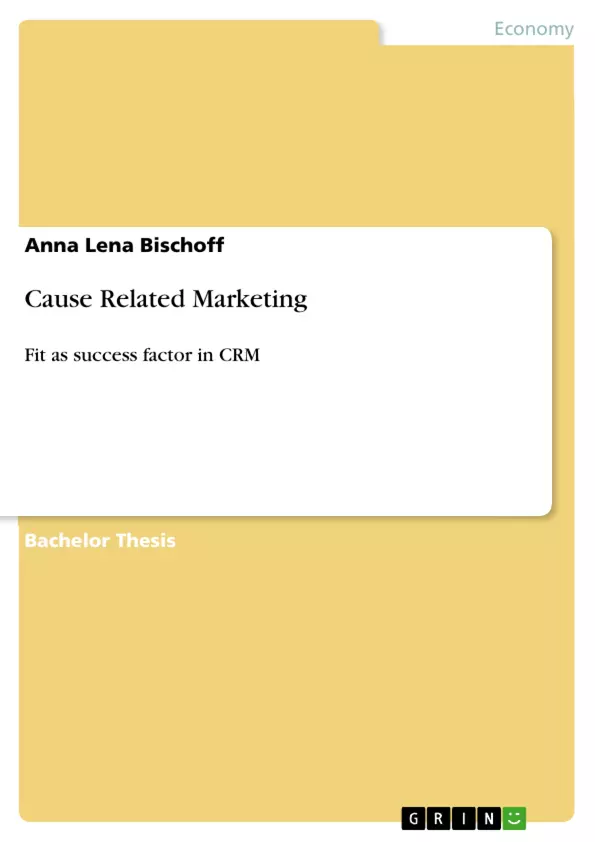The combination of efforts of Profit-Organizations (POs) and Non-Profit-Organizations(NPOs) to benefit from a collaboration has gained increased attention throughout the last couple of years (Belch & Belch, 2004). Events such as the BP oil leak in the Gulf of Mexico, the Enron scandal or the fraudulent participation of investment banks in the most recent financial crisis have fueled the discussion of ethical codes of conduct for corporations, their social responsibility in society and thus their social commitment(Kotler & Lee, 2005), (Hess, Rogovsky, & Dunfee, 2002), (Horrigan, 2010).
The contribution of business entities in social causes made them consider their possibilities to not only act socially responsible, but profitable at the same time (Zdravkovic,Magnusson, & Stanley, 2010). This called marketers to action, designing strategies that
would highlight a company’s willingness to do good, advance the company’s reputable image, enhance customer retention and increase sales (ib.).The success of this new and uprising type of marketing, CRM, is determined by many factors, one of them being the
fit of the collaborating partners (Fries, 2010).
The aim of this work is the presentation of the current state of research of the success of CRM. A further objective of this thesis is the systematic elaboration of empirical studies to draw conclusions about possible effects on the success of CRM campaigns.
Inhaltsverzeichnis (Table of Contents)
- Introduction
- Background
- Definition of Cause-Related Marketing
- Definition of Fit in Cause-Related Marketing
- Overview
- Conceptual Framework
- Fit in Cause-Related Marketing
- Success Effects of Cause-Related Marketing Campaigns
- Moderators
- Methodology of the Empirical Studies
- Results of the Empirical Studies
- Effects of Fit on Cause-Related Marketing Success
- Influences of Fit on Cognitive Success
- Influences of Fit on Affective Success
- Influences of Fit on Conative Success
- Summary of the Influences of Fit
- Moderating Effects
- Brand-related Moderating Effects
- Cause-related Moderating Effects
- Consumer-related Moderating Effects
- Campaign-Related Moderating Effects
- Summary of the Influences of Moderating Effects
- Implications
- Managerial Implications
- Research Implications
- Summary
Zielsetzung und Themenschwerpunkte (Objectives and Key Themes)
This work aims to present the current state of research on the impact of fit on the success of Cause-Related Marketing (CRM). The focus is on the fit between cause/NPO and brand/PO. The thesis also systematically elaborates on empirical studies to identify interactions on the fit and draw conclusions about possible effects on the success of CRM campaigns. Key themes of the work are:- The impact of fit on the success of CRM campaigns
- The definition of fit in the context of CRM
- The influence of fit on cognitive, affective, and conative success of CRM campaigns
- The role of moderating effects on the relationship between fit and CRM success
- Practical and research-oriented implications of the findings
Zusammenfassung der Kapitel (Chapter Summaries)
The introduction provides a brief overview of CRM and its broader context within marketing. It outlines the aims and structure of the work, highlighting the significance of fit in CRM success. Chapter 2 defines CRM and distinguishes it from similar marketing concepts. It also explores the conceptual framework of fit in CRM by introducing independent, dependent variables, and moderating effects. Chapter 3 presents the methodological approach used in the empirical studies to examine the effects of fit on the success of CRM campaigns. Chapter 4 analyzes the results of the empirical studies, focusing on the direct and biased effects of fit on the success of CRM campaigns. This chapter covers the influences of fit on cognitive, affective, and conative success, as well as the role of moderating effects. Chapter 5 discusses both managerial and research-oriented implications derived from the findings.Schlüsselwörter (Keywords)
This work focuses on the concept of fit and its impact on the success of cause-related marketing. Key terms include cause-related marketing (CRM), fit, cognitive success, affective success, conative success, moderating effects, brand-related effects, cause-related effects, consumer-related effects, campaign-related effects, managerial implications, and research implications.Frequently Asked Questions
What is Cause-Related Marketing (CRM)?
CRM is a marketing strategy where a profit-oriented company partners with a non-profit organization to promote a social cause while simultaneously increasing its own sales and image.
Why is the "fit" between brand and cause important?
The "fit" determines the credibility of the campaign. A high perceived alignment between the brand and the social cause leads to better consumer acceptance and higher campaign success.
What are the cognitive and affective success effects of CRM?
Cognitive success refers to improved brand awareness and knowledge, while affective success relates to positive emotional responses and an enhanced brand image.
Which moderators influence the success of a CRM campaign?
Moderators include brand-related factors, the nature of the cause, consumer attitudes, and the specific design of the marketing campaign.
How does CRM relate to Corporate Social Responsibility (CSR)?
CRM is a tactical tool within the broader CSR framework, allowing companies to act socially responsible while also pursuing profitable business objectives.
- Quote paper
- Anna Lena Bischoff (Author), 2011, Cause Related Marketing, Munich, GRIN Verlag, https://www.grin.com/document/188208



